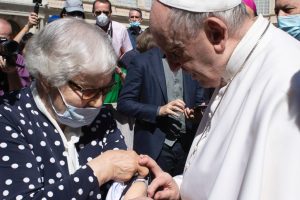Let’s be real: Parenting is hard.
I love being a parent, and it’s by far the most challenging, demanding, and sacrificial part of my life. It’s perfectly fine to hold this both/and tension without downplaying either side of this equation.
The COVID-19 pandemic exacerbated my parental stress. I have less emotional capacity to offer my two children under 4 and often run on autopilot. They deserve more from me.
How does one parent when failure seems to be omnipresent?
My wife, Bryana, introduced me to conscious parenting. Last year, she began a website called Conscious Mommy for those who wish to transform their relationship with their children and spouse.
I’ve learned that parents often fall into cycles, triggered by our children’s behaviors. We repeat the words and actions of our parents—sometimes in ways that can be harmful to the parent-child dynamic. Without taking time to name and recognize these patterns, our parenting devolves into unconscious disengagement and a gradual distancing from the children who, deep down, we immensely love beyond measure.
However, we can become conscious parents by noticing our triggers, our need to control, our patterns of negative interactions with our children, and the ways that we are becoming like our parents and don’t wish to be.
Even though Bryana is a conscious parenting teacher, I’m still a conscious parenting novice. But what has helped me grow in becoming more in tune with my children is the Daily Examen prayer of St. Ignatius of Loyola. In my opinion, the best contemporary explanation of the Examen is Jesuit Father George Aschenbrenner’s seminal article, “Consciousness Examen.”
While many of us associate the examination of conscience with reviewing a list of sins we’ve committed since our last confession, Aschenbrenner advocates that we perform an examination of consciousness using the steps of the Ignatian Examen to notice God’s presence in our lives and expand our capacity to receive God’s love and reflect this to all with whom we interact.
I adapted the steps of the Examen in the following manner, geared to dispose us to intertwine our faith in God and our desire to become more conscious parents:
Search for enlightenment
In this first step, we ask God for the grace to know who we are through the Trinity’s merciful lens and to see our lives and ourselves as God does. As St. Augustine notes in Confessions, God is closer to us than we are to ourselves. Psalm 139 can be a great passage to lead us to God’s enlightenment.
This step is significant because without the Spirit’s prompting we can fall into two extremes: discouragement over our shortcomings as a parent, which can conjure shame and despair, and defensiveness/self-justification, which can prolong and potentially exacerbate any discord in our family dynamics.
When we ask for God’s light, we simultaneously ask for the grace to let go of self-criticism and self-doubt, which fertilize the seeds planted by the enemy (Matt. 13:28) that promote self-hatred. This must be prevented and uprooted. We cannot love God with our whole heart, or love our neighbor as ourselves (Mark 12:30–31), if we do not first love ourselves.
God, on the other hand, offers us unchanging, eternal love. When we see our interactions through a trinitarian lens, we can see ourselves in truth, both in terms of our inherent goodness and in how God is mercifully calling us to grow in our capacity to love and receive love.
Thanksgiving
Although it seems counterintuitive to offer thanks before receiving a gift, both St. Ignatius and Aschenbrenner emphasize the centrality of gratitude in our relationship with God. This is an exercise of humility and enlightenment.
From a trinitarian viewpoint, we can see both how greatly loved we are and how deeply impoverished we are, inextricably needing God in our lives.
We take this time to thank God for the many blessings in our lives: the gift of trinitarian enlightenment; the gifts of marriage and parenthood, naming our spouse and children; and the desire to grow in our relationship with God and our family members.
Review of our day
We review our day with God, particularly our interactions with our children and spouse:
In what ways did I have a positive interaction? How did that make me feel? Recalling the faces of my children, what was their response? What were the times in the day I felt most connected with my spouse?
What were the times I felt disconnected or had a conflict with my children or spouse? What was going on in me, and what was triggering me? How did my children or spouse respond?
Contrition
When we become aware of the times we’ve hurt our children or spouse, we need not be hard on ourselves. Instead, we invite God into our desire to express sorrow for hurting the ones we love, recognizing our part in what prompted this conflict and our desire to repair what was broken.
Resolution
We ask God to help us be mindful of how much we are loved and how much we love our family, particularly to learn from the times we have fallen and savor the positive interactions. We seek God’s grace to mend any broken relationships and begin anew.
For busy parents, the Examen is a practical prayer that can be done in 5 to 15 minutes before the children are awake, midday, or after the children are asleep. While adding another duty might discourage one from beginning this, the potential results of greater intimacy in the family and stronger bonding far outweigh these perceived costs.
Although I continue to stumble, the Examen helps me become aware of the divine communion amid my family, transforming scarred relationships into newness through healing love.
May this gift from St. Ignatius teach us to grow in conscious parenting and express greater generosity in our homes.
This article also appears in the September 2022 issue of U.S. Catholic (Vol. 87, No. 9, pages 43-44). Click here to subscribe to the magazine.
Image: Unsplash/CDC













Add comment